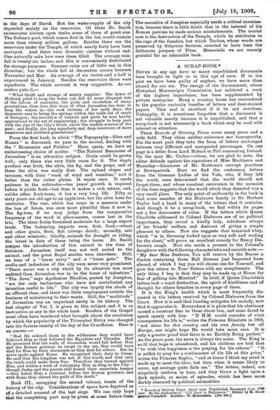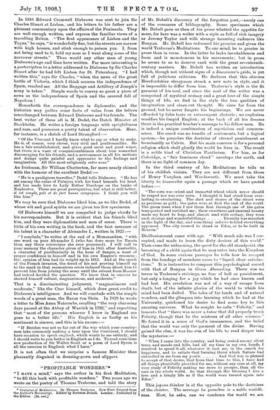A SCRAP-BOOK.*
NEVER in any age have so many unpublished documents been brought to light as in this age of ours. If in the past we have been guilty of neglect, we have more than atoned for our sin. The energy of the Government, whose Historical Manuscripts Commission has achieved a work of the highest importance, has been supplemented by private enterprise. Many a country house has surrendered to the popular curiosity bundles of letters and dust-stained papers. This zeal is excellent if it be not overdone. Unhappily, it is sometimes forgotten that a document is not valuable merely because it is unpublished, and that a scrap-book is not necessarily a book which may be read with interest or attention.
These Records of Stirring Times cover many years and a. wide field. They claim neither coherence nor homogeneity. For the most part they take the form of letters exchanged between very different and unexpected personages. On one page is a letter from Lord Hobart to Pitt concerning Ireland. On the next Mr. Croker—whom, we are glad to note, the editor defends against the aspersions of Miss Martineau and Macaulay—discourses of Mr. Ruthven's corrupt practices at Downpatrick. Here we find the customary letters from the tiresome Ladies of the Vale, who, if they left the world, were determined that the world should not forget them, and whose constant recurrence in the memoirs of the time suggests that the world which they deserted was a very small place. The only point of uniformity in the book is that some member of the Disbrowe family or Sir Herbert Taylor had a hand in many of the letters that it contains. And though it be a scrap-book, we find within its pages not a few documents of value. If the letters which Queen Charlotte addressed to Colonel Diabrowe are of no political importance, they reveal a kindly lady, solicitous always of her friends' welfare, and desirous of giving a simple pleasure to others. Now she suggests that tamarind whey, which "is in Germany looked upon as very soft and cooling for the chest," will prove an excellent remedy for Henry Dia- browe's cough. Now she sends a present to the Colonel's daughters with the following characteristic and amiable note :— "My dear Miss Desbrow, You will receive by the Bearer a Carton containing three Ball Dresses just Imported from abroad, of which I beg you will choose one for Yourself, and give the others to Your Sisters with my compliments. The only thing I beg is that they may be made up at Home for fear of getting into Mischief." In brief, if Queen Charlotte's. letters lack a royal distinction, the spirit of kindliness and of thought for others breathes in every page of them.
It is the King's health which is most frequently dis- cussed in the letters received by Colonel Disbrowe from the Court. Now it is said that hunting mitigates his malady, now that it aggravates it. Everywhere it is plain that his obstinacy caused a constant fear to those about him, and none dared to speak openly with him. "If H.M. would consider of what. consequence his life is," writes the Princess Elizabeth in 1802,, "not alone for this country and his own family but all' Europe, one might hope He would take more care. It is only a greater proof that there is no Earthly Being perfect." As the years pass, the news is always the same. The King is so ill that hope is abandoned, and his children are told that "to wish him happiness is the praying for his release." "It is selfish to pray for a continuance of his life at this price," writes the Princess Sophia, "and at times I think my mind is made up to meet the blow, but then when it seems likely to - occur, my courage quite fails me." The letters, indeed, are - singularly uniform in tone, and they throw a light upon a -. dark episode, or series of episodes, which has been more darkly obscured by political animosities.
" Records of Stirring Times Based upon Unpublished Documents froub 1726. 1822. By the Authoress of "Old Days in Diplomacy." Edited by M. Mont- - gomery-Campbell. London: W. Heinemann, pea net.]
In 1810 Edward Cromwell Disbrowe was sent to join Sir Charles Stuart at Lisbon, and his letters to his father are a pleasant commentary upon the affairs of the Peninsula. They are well enough written, and express the familiar views of a travelling Briton. "The first appearance of Lisbon and the Tagus," he says, "is wonderfully fine, but the streets are narrow with high houses, and stink enough to poison you. I, from not being used to it, held my nose as I went along some of the narrower streets." Thus would any other man of young
Disbrowe's age and time have written. Far more interesting is a posfacripium to a letter addressed to Disbrowe by Sir Charles
Stuart after he had left Lisbon for St. Petersburg. "I had written this," says Sir Charles, "when the news of the great battle of Victoria, which I think secures the independence of Spain, reached me. All the Baggage and Artillery of Joseph's army is taken." Simple words to convey so great a piece of news as the independence of Spain and the assured fall of Napoleon !
Henceforth the correspondence is diplomatic, and the historian may gather some facts of value from the letters
interchanged between Edward Disbrowe and his friends. The best writer of them all is M. Dedel, the Dutch Minister at Stockholm. He writes a foreign language with sprightliness and ease, and possesses a pretty talent of observation. Here, for instance, is a sketch of Lord Strangford :— "Of the Viscount I hardly know what to say or what to make. He is, of course, very clever, very civil and gentlemanlike. He has a fair establishment, and gives good meat and good wines, but there is a want of companionableness about him somewhat discouraging for his friends, and a nervousness in all his motions and doings quite painful and oppressive to the feelings and imagination. All this most religiously entre nous."
An Irishman, Sir William Chatterton, far more nearly chimed with the humour of the excellent Dedel :—
"He is a prodigious traveller," Dedel tells Disbrowe. "He has sat among the ruins of Palmyra with his hand beneath his head, and has made love to Lady Esther Stanhope on the banks of Euphrates. Those are great prerogatives, but what is still better, al eat simple, poli et de fort bonne compagnie. I think you will like him."
We may be sure that Disbrowe liked him, as we like Dedel, of whose wit and good spirits we are given too few specimens.
Of Disbrowe himself we are compelled to judge chiefly by his correspondents. But it is evident that his friends liked him, and they were diplomatists and men of sense. There is little of his own writing in the book, and the best measure of
his talent is a character of Alexander I., written in 1825 :— " I conclude," he writes at the end of a Memorandum, "with one word on poor Alexander I. (who has done more for Russia than any three sovereigns she ever possessed). I will call to your memory the character given of him in 1805 after Austerlitz, a character of pusillanimity in the hour of danger, a want of proper confidence in himself and in his own Empire's resource ; this opinion of him had its weight up to 1812. And at the epoch of the French invasion, the dread of his not proving himself up to the mark in that momentous crisis induced those about him to prevent him from joining the army until the retreat from Moscow had indeed decided the question. We know that in success he showed himself valiant, magnanimous, and moderate."
That is a discriminating judgment, "magnanimous and moderate," like the Czar himself, which does great credit to Disbrowe's intelligence. And we will conclude with the simple words of a great man, the Baron on Stein. In 1828 be wrote a letter to Miss Anna Nutcombe, recalling "the very charming days passed at the Abbey of Warrick in 1792," and regretting
that "most of the persons whoever I knew in England are gone to a better life." His English is as faulty as his
sentiment is sincere, and this is his excuse ;—
" If Breslau was not so far out of the way which your country- men take commonly making a tour upon the Continent, I should have occasion to speak englisch, which wants to me entirely, and I should write to you better in Englisch as I do. To read some time new production of Sir Walter Scott or a poem of Lord Byron is all the exercise in Englisch what I have."
It is not often that we surprise a famous Minister thus pleasantly disguised in dressing-gown and slippers.







































 Previous page
Previous page